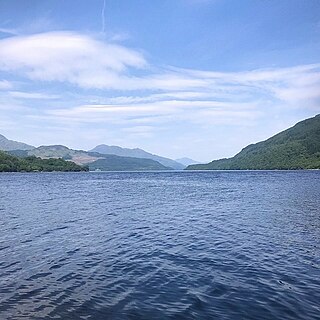
Loch Lomond is a freshwater Scottish loch which crosses the Highland Boundary Fault, often considered the boundary between the lowlands of Central Scotland and the Highlands. Traditionally forming part of the boundary between the counties of Stirlingshire and Dunbartonshire, Loch Lomond is split between the council areas of Stirling, Argyll and Bute and West Dunbartonshire. Its southern shores are about 23 kilometres (14 mi) northwest of the centre of Glasgow, Scotland's largest city. The Loch forms part of the Loch Lomond and The Trossachs National Park which was established in 2002.

Runrig were a Scottish Celtic rock band formed on the Isle of Skye in 1973. From its inception, the band's line-up included brothers and songwriters Rory MacDonald and Calum MacDonald (percussion). The line-up during most of the 1980s and 1990s also included Donnie Munro (vocals), Malcolm Jones (guitar), Iain Bayne (drums), and Pete Wishart (keyboards). Munro left the band in 1997 to pursue a career in politics and was replaced by Bruce Guthro. Wishart left in 2001, also to pursue a career in politics, and was replaced by Brian Hurren. The band released fourteen studio albums, with a number of their songs sung in Scottish Gaelic.

PS Maid of the Loch is the last paddle steamer built in the United Kingdom. She operated on Loch Lomond for 29 years and as of 2022 is being restored near Balloch pier.
"The Skye Boat Song" is a late 19th-century Scottish song adaptation of a Gaelic song composed c.1782 by William Ross, entitled Cuachag nan Craobh. In the original song, the composer laments to a cuckoo that his unrequited love, Lady Marion Ross, is rejecting him. The 19th century English lyrics instead evoked the journey of Prince Charles Edward Stuart from Benbecula to the Isle of Skye as he evaded capture by government soldiers after his defeat at the Battle of Culloden in 1746.
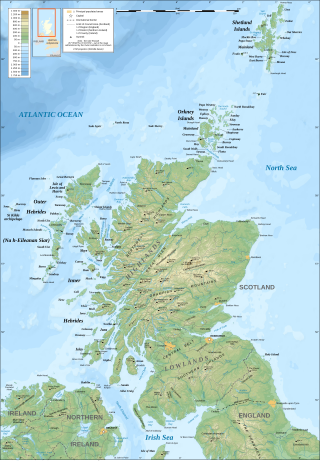
The geography of Scotland is varied, from rural lowlands to unspoilt uplands, and from large cities to sparsely inhabited islands. Located in Northern Europe, Scotland comprises the northern part of the island of Great Britain as well as 790 surrounding islands encompassing the major archipelagos of the Shetland Islands, Orkney Islands and the Inner and Outer Hebrides. The only land border is with England, which runs for 96 miles in a northeasterly direction from the Solway Firth in the west to the North Sea on the east coast. Separated by the North Channel, the island of Ireland lies 13 nautical miles from Mull of Kintyre on the Scottish mainland. Norway is located 190 nmi (350 km) northeast of Scotland across the North Sea. The Atlantic Ocean, which fringes the coastline of western and northern Scotland and its islands, influences the temperate, maritime climate of the country.
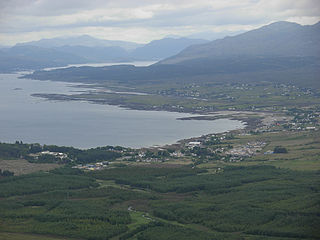
Broadford, together with nearby Harrapool, is the second-largest settlement on the Isle of Skye, Scotland. Lying in the shadow of the Red Cuillin mountains, Broadford is within the parish of Strath. A long meandering village historically consisting of a few buildings on either side of the Broadford River, the many small townships around the wide sweep of the bay have grown together and Broadford now stretches for 1+1⁄2 miles around the southern side of Broadford Bay.

Christopher James Harley, known by the stage name Chris Rainbow, was a Scottish pop rock singer and musician whose songs "Give Me What I Cry For" and "Solid State Brain" were often played by British radio DJs Kenny Everett and Tony Blackburn in the 1970s.

"The Bonnie Banks o' Loch Lomond", or "Loch Lomond" for short, is a Scottish song. The song prominently features Loch Lomond, the largest Scottish loch, located between the council areas of West Dunbartonshire, Stirling and Argyll and Bute. In Scots, "bonnie" means "attractive", "beloved", or "dear".
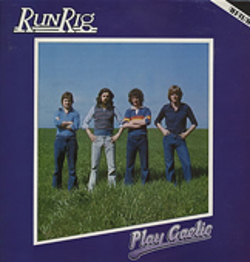
Play Gaelic is the first album by the Scottish Celtic rock band Runrig. It was released in 1978 on LP and tape by Neptune Records. In 1990 it was re-released on CD by Lismor Recordings with different cover art.
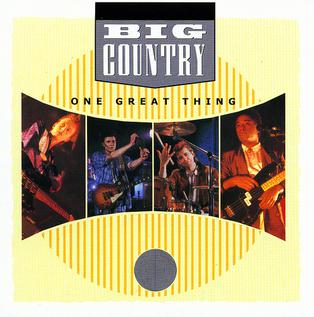
"One Great Thing" is the third single from Scottish band Big Country's 1986 album, The Seer. The composition of the song and in particular the guitar solo appears to feature similar melody from the chorus of Bonnie Banks O' Loch Lomond. After the somewhat disappointing chart performance of the band's previous single "The Teacher", the song reached No. 19 in the UK Singles Chart.
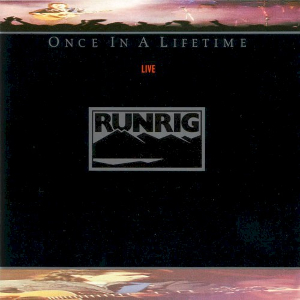
Once In A Lifetime is a live album by Scottish Celtic rock band Runrig. It was released in 1988.

Year of the Flood is the DVD and CD of Runrig's Beat the Drum open air concert on 18 August 2007, filmed at Borlum Farm near Drumnadrochit on the shores of Loch Ness.

Dun Ringill is an Iron Age hill fort on the Strathaird peninsula on the island of Skye, Scotland. Further fortified in the Middle Ages, tradition holds that it was for several centuries the seat of Clan MacKinnon. It is located east of Kirkibost on the west shore of Loch Slapin.
This is a list of the extreme points and extreme elevations in Scotland.

Crack the Skye is the fourth studio album by American heavy metal band Mastodon, released on March 24, 2009, through Reprise, Sire and Relapse Records. The album debuted at number 11 on the Billboard 200, selling 41,000 copies in its first week. In Australia, the album debuted at number 19. It had sold 200,000 copies in the US as of September 2010, making it one of their highest-selling albums to date.
The (What's the Story) Morning Glory? Tour was a concert tour by English band Oasis in support of their second album (What's the Story) Morning Glory?. The tour, which spanned the UK, Europe, the US and Canada, included 103 shows over a period of several months in 1995 and 1996 amidst twelve different tour legs and several cancelled legs in the US and Australia/New Zealand. The tour started on 22 June 1995 with a pre-Glastonbury festival warm up gig at the Bath Pavilion which featured the debut of new drummer Alan White and several new songs off the album which wasn't to be officially released until early October, and ended on 10 September 1996 at the Nissan Pavilion in Bristow, Virginia, when the band decided to halt touring to focus on the recording of their anticipated third album, Be Here Now.

Falls of Falloch is a waterfall and local beauty spot on the river Falloch off the A82. It is 7 km (4 mi) south-west of the village of Crianlarich in the county of Stirling in Scotland. It is also on the West Highland Way.
Dàimh is a folk band which performs in Scottish Gaelic.














